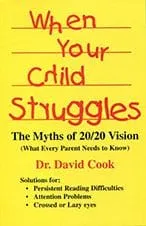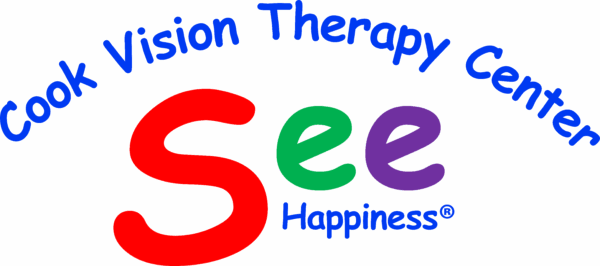Cerebral Palsy Vision Therapy
For Your Child with Cerebral Palsy
Cerebral Palsy (CP) and Vision Therapy
Cerebral Palsy (CP) is a neurological condition caused by early brain damage, often leading to challenges with muscle control. Many individuals with CP are highly intelligent, even if they struggle with movement in their hands, legs, lips, tongue, or eye coordination.
Dr. Cook received residency training in vision therapy for those with CP at United Cerebral Palsy in New York City.
Understanding Visual Impairments in Cerebral Palsy
Children with cerebral palsy (CP) frequently experience visual impairments caused by brain damage that disrupts visual processing or directly affects eye function. Research from Marietta, GA pediatric neurologists reveals that 75–90% of children with CP have some form of vision impairment, ranging from mild to severe. Early diagnosis is vital for improving outcomes, making awareness of these challenges essential for parents and caregivers in Cobb County.
Types of Visual Impairments in CP
Cerebral Visual Impairment (CVI)
CVI occurs when brain damage disrupts visual processing, not the eyes themselves. Common symptoms in children with CP include:
-
Difficulty focusing on objects
-
Blurred or “fluctuating” vision
-
Challenges recognizing faces or navigating crowded spaces
-
Loss of peripheral vision
Though CVI symptoms rarely worsen, Marietta vision therapists emphasize that early interventions, like specialized glasses or light therapy, can significantly improve visual function.
Strabismus & Refractive Errors
Strabismus (misaligned eyes) is common in children with CP and may lead to double vision or amblyopia (“lazy eye”). Cobb County eye specialists recommend treatments like:
-
Custom corrective lenses
-
Patching therapy to strengthen weaker eyes
-
Surgical correction for severe cases
Refractive Errors
Many children with CP struggle with nearsightedness, farsightedness, or astigmatism. These issues can hinder reading and motor skills.
Nystagmus & Why This Matters
This condition causes rapid, involuntary eye movements, reducing visual clarity. While glasses can help, some cases require surgery—a service offered by Marietta pediatric ophthalmologists—to stabilize vision.
Why Early Intervention Matters in Marietta, GA
Undiagnosed vision issues can delay learning, limit mobility, and lower quality of life for children with CP. However, personalized vision therapy (available at clinics across Cobb County) can dramatically improve developmental outcomes.
How Vision Therapy Helps Children with CP in Marietta, GA
Vision therapy is a non-surgical, personalized treatment that strengthens how the brain and eyes communicate. For children with cerebral palsy in Cobb County, it tackles challenges like eye misalignment, poor tracking, and trouble focusing—common issues addressed by Marietta pediatric vision therapists.
Key Components of Vision Therapy
-
Ocular Motor Training: Improves control of eye movements (e.g., tracking moving toys or switching focus between a book and a whiteboard).
-
Visual Perception Enhancement: Helps children interpret shapes, letters, and spatial relationships—critical for classroom success.
-
Eye-Hand Coordination: Activities like bead threading or ball-catching, offered at Cook Vision Therapy Center, bridge vision and motor skills.
-
Customized Plans: Therapies are tailored to each child’s needs, ensuring progress even with severe motor limitations.
Top Benefits for Families
-
Corrects eye alignment (reducing strabismus risks)
-
Boosts reading speed and concentration
-
Minimizes headaches from eye strain
-
Enhances balance and coordination through sharper visual input
Expert Insight: Vision therapy is a cornerstone of CP care here. When combined with physical or occupational therapy, it unlocks developmental milestones faster.
Why Personalized Vision Therapy Works for CP
Cerebral palsy varies widely between children, so vision therapy in Cobb County requires customization to address each child’s motor, cognitive, and visual needs.
1. Assessment-Based Therapy Plans
Comprehensive evaluations—common at clinics like Cook Vision Therapy Center —pinpoint specific impairments, ensuring exercises target the right skills.
2. Adaptive Exercises for CP Challenges
Therapists adjust activities for motor or attention limitations, such as:
-
Using oversized toys for easier tracking
-
Involving caregivers to keep sessions engaging
-
Incorporating speech-friendly tools for kids with communication barriers
3. Multidisciplinary Integration
Vision therapy pairs seamlessly with occupational/physical therapies at Cobb County clinics to improve balance and coordination.
4. Assistive Technology
Tools like high-contrast cards, tinted lenses, or apps (e.g., CP Vision Helper, used by Marietta therapists) extend progress beyond clinical sessions.
Over half of children with cerebral palsy have eyes that cross, drift, or wander (strabismus). If the eyes drift intermittently, vision therapy in Marietta, GA, may improve these eye-muscle coordination issues, reducing cosmetic concerns and enhancing focus.
Some individuals with CP have eyes that appear straight but still struggle with treatable coordination problems. These issues can cause blurry or double vision (see Convergence Insufficiency and 3D Vision). In fact, 90% of children with CP find it difficult to keep text clear while reading.
If a child or adult with CP in Marietta, GA, isn’t reaching their potential, a Vision Therapy evaluation at Cook Vision Therapy is essential. Our clinic has helped many individuals with mild CP achieve significant improvements in coordination, reading, and daily life.
How to Support Your Child’s Vision Therapy at Home (Tips for Marietta Families)
- Work with Their Therapists: Ask your child’s Marietta OT or PT about simple eye-hand coordination games (e.g., bead threading) to practice during playtime.
- Home Tweaks for Safety: Use bright-colored tape on stairs or toys to help with depth perception. Dim glare from windows with light-filtering shades.
- Daily 10-Minute Games: Try flashlight tracking on the wall or “I Spy” with high-contrast cards to build focus between sessions.
Cerebral Palsy Life Span: What to Expect
If you or a loved one has been diagnosed with cerebral palsy (CP), understanding life expectancy is a common concern. Cerebral palsy is a lifelong neurological condition that affects movement, muscle tone, and coordination, but it does not get worse over time—the brain injury causing CP is stable and non-progressive. However, the life span of someone with CP can vary widely based on several factors.
Factors Influencing Cerebral Palsy Life Span
-
Severity of Symptoms: Mild cases of cerebral palsy generally have a life expectancy similar to the general population. Children with mild CP have a 99% chance of living to age 20, according to expert Dr. Ananya Mandal, a clinical pharmacologist.
-
Associated Health Conditions: Conditions such as seizures, intellectual disabilities, vision or hearing problems, feeding difficulties, and respiratory issues can impact life span. Severe CP, especially when multiple impairments are present, may result in a shorter life expectancy.
-
Mobility and Independence: Greater mobility and independence, often supported by adaptive equipment and medical care, contribute to a longer, healthier life.
-
Access to Treatment and Support: Regular medical care, therapy, and community support play a major role in improving outcomes and extending life expectancy.
What Research Shows
Most children with cerebral palsy can expect to live between 30 and 70 years, but many with milder forms live just as long as those without CP. Advances in medical care, early intervention, and better management of complications have improved survival rates for people with CP in recent decades.
How Long Do People with Cerebral Palsy Live?
The answer to “how long do people with cerebral palsy live?” is not one-size-fits-all. Life expectancy depends on the individual’s unique circumstances, including the severity of their condition and the presence of other health issues.
Key Points About Life Expectancy
-
Mild Cerebral Palsy: Most people with mild CP have a normal life expectancy, often living well into adulthood and even old age.
-
Severe Cerebral Palsy: Those with severe symptoms, especially when combined with multiple impairments, may have a shorter life span. For example, children with severe CP at age 2 have a 40% chance of living to 20, according to clinical studies.
-
Ongoing Care: Consistent medical care, pain management, and support for independence can help maximize both quality and length of life.
-
Survival Trends: Survival rates have improved over time due to better treatments and awareness of associated health risks.
Expert Insights
Leading pediatricians and neurologists emphasize that while CP itself is not progressive, managing associated conditions is crucial for a long, healthy life. Organizations like the National Institutes of Health (NIH) and the National Institute of Neurological Disorders and Stroke (NINDS) provide up-to-date information and guidelines for families and caregivers.
“The majority of children with cerebral palsy will live long, productive lives with the proper treatment and care,” says a board-certified pediatrician from Cerebral Palsy Guidance. Source
Success Story from a Marietta, GA Family
“Stephanie has been diagnosed with Cerebral Palsy, since she was very small. We weren’t sure how extensive the problem was until school. The doctor’s didn’t really prepare us for everything. But when we found out she had a reading/writing problem, we didn’t know what to do to help her. She had headaches frequently to the point of becoming sick. Then her tutors suggest Dr. Cook’s Vision Therapy. We called for our appointment and were so amazed at what we learned. All the problems we’d been having concerning school and even balance could be helped tremendously! And we’ve noticed a great improvement in schoolwork and reading. She can actually read books for her age group! Something we thought wouldn’t happen for years. Her balancing is even better. She doesn’t bump into walls and fall down anymore (hardly).”
Free Internet Screening and Phone Consultation
If you or your child struggles with reading, call for a Free Phone Consultation. End the struggle!
About Cook Vision Therapy Center
At Cook Vision Therapy Center in Atlanta, we provide specialized vision therapy for individuals with cerebral palsy, offering over 30 years of experience helping patients across Georgia. Our therapy focuses on improving eye function, enhancing coordination, and optimizing visual skills for daily activities like reading, schoolwork, and sports. We address challenges such as headaches, eyestrain, and difficulty with focus, while boosting self-esteem and depth perception. Our team works to improve eye-body coordination and help patients achieve better control in both their vision and physical movements, empowering them to live more independent and fulfilling lives.
FAQs: Cerebral Palsy Vision Therapy in Marietta, GA
-
What is cerebral palsy vision therapy?
Cerebral palsy vision therapy in Marietta, GA, is a customized program to improve eye coordination, focus, and visual processing. It addresses issues like strabismus (crossed eyes), convergence insufficiency, and depth perception problems common in CP patients, enhancing reading, balance, and daily tasks through targeted exercises.
-
How does vision therapy help children with cerebral palsy?
-
Can vision therapy fix crossed eyes (strabismus) in CP patients?
-
Why choose Cook Vision Therapy for CP-related vision issues?
-
Are there home exercises to support vision therapy for CP?
-
What age is best to start vision therapy for cerebral palsy?
-
Does insurance cover cerebral palsy vision therapy in Marietta?
-
How long does cerebral palsy vision therapy take?
-
What makes Cook Vision Therapy different from regular optometry?
-
What signs indicate a child with cerebral palsy needs vision therapy?
-
Can adults with cerebral palsy benefit from vision therapy?
-
What professionals are involved in cerebral palsy vision therapy?
-
How can families support vision therapy progress at home?
-
How does cerebral palsy affect life expectancy?
-
What is the average life expectancy for someone with cerebral palsy?
-
How does cerebral palsy affect life expectancy?
-
Can people with mild cerebral palsy live a normal life?
-
What factors reduce life expectancy in cerebral palsy?
-
How has life expectancy for cerebral palsy changed over time?
-
What can be done to improve life expectancy for someone with cerebral palsy?
-
Can therapy and medication increase life expectancy for cerebral palsy?
-
Is cerebral palsy life expectancy the same for everyone?
Check Out Our Resources
Dr. Cook’s Publications:
- Authored books VISUAL FITNESS and WHEN YOUR CHILD STRUGGLES.
- Published articles in top optometric journals.
- His article “Eyesight, infinity and the human heart” was voted “Best Non-Technical Article” by the Association of Optometric Editors.





